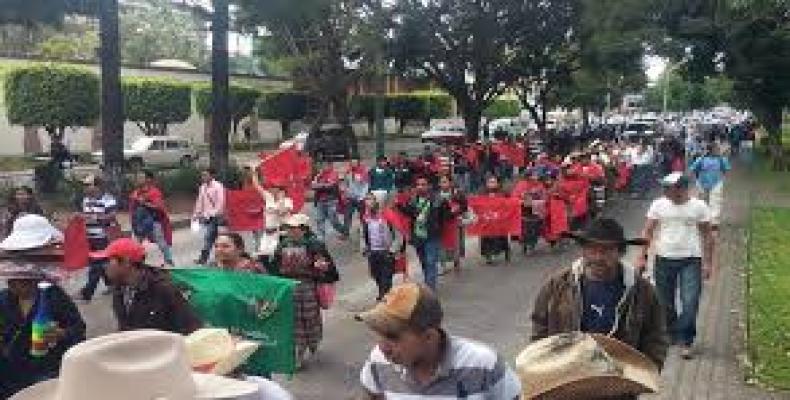Guatemala City, July 27 (RHC)-- Popular movements demand in Guatemala have called for an end to government subsidies for wealthy foreign corporations that deprive ailing public services of needed funds.
Accusing the country's top elected officials of racketeering, hundreds of campesinos and Indigenous people poured into the streets in Guatemala City in the latest of a series of protests against government corruption, corporate greed, and the criminalization of social movements.
Led by the Committee of Campesino Development, demonstrators set out from four points across the city to march on Central Park — which was Ground Zero for thousands of anti-corruption protesters over a period of several months last year amid a spate of high-level corruption scandals that eventually forced former President Perez Molina to resign.
The mass mobilization demanded transparent investigations against all members of Congress following revelations of widespread systemic corruption in government institutions. Demonstrators also demanded that police free jailed movement leaders and human rights defenders, and reinvest government subsidies for large corporations into ailing public services like healthcare.
The Committee of Campesino Development released a statement expressing support for the Attorney General’s office and the International Commission Against Impunity in Guatemala, better known as Cicig, which have spearheaded a number of high-level fraud and bribery cases in recent months implicating powerful business people and politicians, including former President Otto Perez Molina.
The march called for authorities to "put people before profits," to repeal tax exemptions for large corporations, including the low wage manufacturing or "maquila" sector and foreign call center operations, with benefit from the tax laws designed to attract foreign investment.
The protest also criticized the lack of political commitment from President Jimmy Morales and his government to listen to and consider popular demands. In the first half of this year since Morales was inaugurated, Indigenous people and campesinos have already held two similar mobilizations in February and May as well as an 11-day national march in April demanding protection of the right to water for vulnerable and remote communities.
Underlying the popular protests is a core demand from Indigenous and campesino communities for a Popular and Plurinational National Constituent Assembly to reformulate the Guatemalan state.
The march against government and corporate corruption comes as a Guatemalan court considers the case known as State Cooptation which accuses Perez Molina, his former Vice President Roxana Baldetti, and 55 other individuals of running a massive corruption and money laundering network in government institutions that robbed at least $66 billion U$D from public coffers and through bribery schemes.
Corruption scandals involving the highest level of government have also fueled outrage over underfunding and crisis in public services, especially the health system.
In the wake of Perez Molina’s resignation last September, Guatemala’s Public Health and Social Assistance Chief Mariano Rayo said in November that the health system was in a situation of “absolute disaster” and that the country’s hospitals are in a “pathetic state.”
Guatemalan Indigenous and Campesino Activists March Against State Corruption


